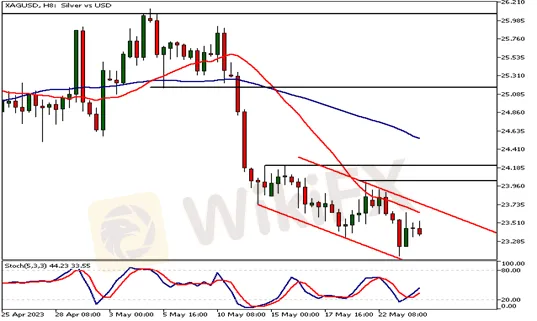Abstract:On Wednesday House Speaker Kevin McCarthy planned to send Republican negotiators to the White House to finish out debt limit talks, but warned that the two sides are “still far apart” as they try to reach a budget deal with President Joe Biden. This causes US equities traded lower yesterday because the negotiations over the debt ceiling continued to create uncertainty.

On Wednesday House Speaker Kevin McCarthy planned to send Republican negotiators to the White House to finish out debt limit talks, but warned that the two sides are “still far apart” as they try to reach a budget deal with President Joe Biden. This causes US equities traded lower yesterday because the negotiations over the debt ceiling continued to create uncertainty.
Treasury Secretary Janet Yellen has issued a warning, cautioning that a potential default could occur as early as June 1. This impending deadline adds to the mounting pressure and anxiety surrounding the debt ceiling negotiations. Despite ongoing discussions, yesterdays meeting between President Biden and McCarthy ended without a deal.
The debt ceiling impasse in Washington has triggered a safe-haven effect, with investors flocking to the USD. Also, hawkish Fedtalk has further boosted the dollar‘s strength, even in the face of potential default and recession risks. Market participants are now anticipating that interest rates will remain elevated for the time being. The release of the FOMC Minutes in the US session today reveals more about Fed bankers’ thinking.
As earnings season winds down, a remarkable 77% of S&P 500 companies have surpassed consensus expectations. This impressive performance can be attributed to better-than-anticipated revenue growth, economic resilience, and cost-control initiatives implemented by companies across various sectors. The markets, however, focused on the near-term risks. Ten out of eleven S&P 500 sectors ended the day in the red. The only sector to gain was the energy sector (1.09%). Basic materials, technology and telecommunication sectors were the biggest losers shedding 1.55%, 1.48% and 1.24% respectively.
The annual UK April headline inflation (8.7%) declined compared to March (10.1%), but the focus should be on the core annual inflation figure, which increased substantially (+6.8% vs +6.2% y/y expected). Price pressures are still strong in the UK economy. While food price inflation remains high with only a slight decrease, the drop in headline annual inflation is primarily due to base effects following last years surge in energy prices. The core annual inflation rate is currently at its highest level since March 1992.
The NZD took a dive today, dropping 1.3% after the Reserve Bank of New Zealand signalled an end to rate hikes. The Reserve Bank of New Zealand (RBNZ) rate hike was in line with expectations. The central bank raised interest rates by 25 basis points and surprised the markets with a dovish overall tone and guidance. This triggered a sell-off of more than 1.3% in NZD.

GBPUSDH80524
GBPUSD
GBPUSD rallied as the CPI numbers showed the price pressures remain in the UK economy. The market tries to break out of the bearish channel and could turn bullish above 1.2446. Above the level, look for a move to 1.2480 and then to 1.2415 on extension. Below 1.2446, the market might move to 1.2380.

NAS
Nasdaq is short-term bearish below 13 760 after yesterdays bearish engulfing candle. Below 13 760 the market probably trades to 13 630 and then possibly to 13 500 on extension. Above 13 760, look for a move to 13 890.

Silver
Silver is bearish below 23.64 and might trade down to 22.70. Above 23.64, look for a move to 24.10. Silver has a fairly high correlation to gold so if the fall in the US 10-yr. yield continues today both precious metals could appreciate.















